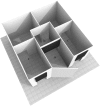Spatial reversal learning is impaired by age in pet dogs
- PMID: 23529504
- PMCID: PMC3824977
- DOI: 10.1007/s11357-013-9524-0
Spatial reversal learning is impaired by age in pet dogs
Abstract
Aged dogs spontaneously develop progressive decline in both cognitive and behavioral function, in addition to neuropathological changes, that collectively parallel several aspects of human aging and Alzheimer's disease progression and likely contribute to the development of canine cognitive dysfunction syndrome. In the current study, ethologically relevant spatial learning, retention, and reversal learning tasks were conducted, with the goal of expanding canine neuropsychological testing to pet dogs. Initially, dogs (N = 44, aged 7.8 ± 2.8 years, mean ± SD) had to learn which of two alternative routes successfully led out of a T-maze. Two weeks later, long-term memory retention was assessed, immediately followed by a reversal learning task in which the previously correct route out of the maze was reversed compared with the initial learning and memory retention tasks. No effects of age were evident on the learning or retention tasks. However, older (≥ 8 years) dogs were significantly impaired on the reversal learning task compared with younger ones (< 8 years). Moreover, trial response latency was significantly increased in aged dogs across both the initial and reversal learning tasks but not on the retention task, which suggests that processing speed was impaired by increasing age during the acquisition of novel spatial information but not during performance of previously learned responses. Overall, the current study provides a framework for assessing cognitive function in pet dogs, which should improve understanding of the effects of aging on cognition in the dog population.
Figures


Similar articles
-
Aging effects on discrimination learning, logical reasoning and memory in pet dogs.Age (Dordr). 2016 Feb;38(1):6. doi: 10.1007/s11357-015-9866-x. Epub 2016 Jan 4. Age (Dordr). 2016. PMID: 26728398 Free PMC article.
-
Effect of age on discrimination learning, reversal learning, and cognitive bias in family dogs.Learn Behav. 2018 Dec;46(4):537-553. doi: 10.3758/s13420-018-0357-7. Learn Behav. 2018. PMID: 30251103 Free PMC article.
-
A rapid serial reversal learning assessment for age-related cognitive deficits in pet dogs.Behav Processes. 2021 May;186:104375. doi: 10.1016/j.beproc.2021.104375. Epub 2021 Mar 12. Behav Processes. 2021. PMID: 33722587
-
Landmark discrimination learning in the dog: effects of age, an antioxidant fortified food, and cognitive strategy.Neurosci Biobehav Rev. 2002 Oct;26(6):679-95. doi: 10.1016/s0149-7634(02)00039-8. Neurosci Biobehav Rev. 2002. PMID: 12479842 Review.
-
Cognitive experience and its effect on age-dependent cognitive decline in beagle dogs.Neurochem Res. 2003 Nov;28(11):1677-82. doi: 10.1023/a:1026009005108. Neurochem Res. 2003. PMID: 14584821 Review.
Cited by
-
Cognitive and sensory capacity each contribute to the canine spatial bias.Ethology. 2024 Feb;130(2):e13423. doi: 10.1111/eth.13423. Ethology. 2024. PMID: 38434251 Free PMC article.
-
Dog-Human Play, but Not Resting Post-Learning Improve Re-Training Performance up to One Year after Initial Task Acquisition in Labrador Retriever Dogs: A Follow-On Study.Animals (Basel). 2020 Jul 21;10(7):1235. doi: 10.3390/ani10071235. Animals (Basel). 2020. PMID: 32708101 Free PMC article.
-
Cognitive Aging in Dogs.Gerontology. 2018;64(2):165-171. doi: 10.1159/000481621. Epub 2017 Oct 25. Gerontology. 2018. PMID: 29065419 Free PMC article. Review.
-
Gut Microbiome Composition is Associated with Age and Memory Performance in Pet Dogs.Animals (Basel). 2020 Aug 24;10(9):1488. doi: 10.3390/ani10091488. Animals (Basel). 2020. PMID: 32846928 Free PMC article.
-
Relationship between engagement with the impossible task, cognitive testing, and cognitive questionnaires in a population of aging dogs.Front Vet Sci. 2023 Jan 4;9:1052193. doi: 10.3389/fvets.2022.1052193. eCollection 2022. Front Vet Sci. 2023. PMID: 36686191 Free PMC article.
References
MeSH terms
LinkOut - more resources
Full Text Sources
Other Literature Sources
Medical
